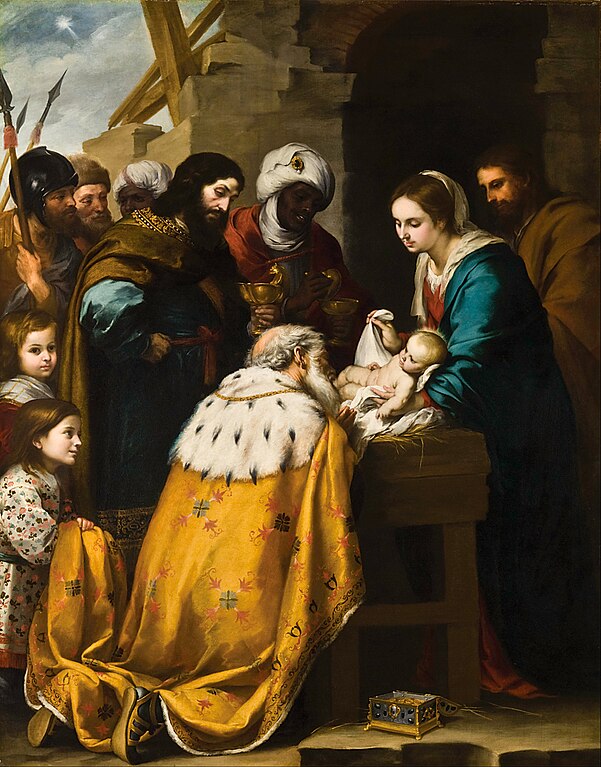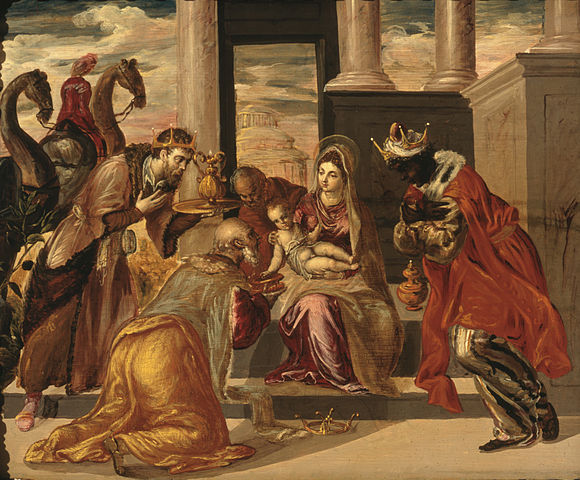
Bartolomé Esteban Murillo ((1617–1682)
Toledo Museum of Art
Public Domain
We saw his star at its rising and have come to do him homage. (Matthew 2:2)
Epiphany Sunday in most Christian liturgical calendars is celebrated on the nearest Sunday prior to 6 January, the traditional date of the solemnity. On the Roman Catholic church calendar, it was always celebrated on that date (twelve days after the birth of Jesus) to commemorate the arrival of the Magi as noted in both Luke and Matthew. Protestant denominations generally kept this observance (except the strictest ones such as Puritans) as the arrival of the Magi reveals to the world the birth of the savior. The Catholic church moved the solemnity in 1970 to be observed on the first Sunday after the new year, so it is no longer celebrated on 6 January.
The observance goes back to the third century when church leaders established Epiphany to recognize the birth, baptism, the arrival of the Magi, and the first miracle in Cana. This celebration predates the observance of Jesus’ birth as that was not yet observed. That would begin in the fourth century when Advent and Christmas would begin to be observed. The importance of celebrating Epiphany is to have Christians reflect on the gifts brought by the Magi, how those gifts revealed the world to Jesus, and the gifts that Jesus has for each and every one of us.

El Greco (1541–1614)
Museo Soumaya at Plaza Carso
Public domain via Wikimedia Commons
In older times, 6 January was considered the Twelfth Day of Christmas and marked the end of the season. Usually there would be a feast, and decorations would begin to be taken down. However, changes in church calendars have altered that. Only the Eastern Orthodox church celebrates the actual day (but since they use the Julian calendar it occurs on 19 January). However, many of the traditions around it still continue to be observed. In some countries, putting the names of the Magi on house doors is common. Others celebrate with special cakes or processions (Dia de los Reyes) with parades and gifts for children. La Befana, the Christmas Witch, has the kids in Italy waiting for the morning with gifts and candy from her. France has special cake, Galette des Rois, with the figure of baby Jesus inside it to be found by a lucky person. And many Spanish speaking countries (and localities) have Los Reyes Magos festivities and gifts for kids as well. So, the day is a festive one for many people. And a nice way to wind down the Christmas season
For Further Reading
Jessica Van Roekel, “What Is Epiphany? Bible Meaning and Holiday Traditions,” Christianity.Com, last modified December 30, 2024, https://www.christianity.com/wiki/holidays/is-epiphany-three-kings-day-a-biblical-holiday.html.
Catholic Answers, “Epiphany 2025 | Catholic Answers Guide,” Catholic Answers, last modified December 11, 2024, https://www.catholic.com/tract/epiphany-2025-catholic-answers-guide.
Msgr. Charles Pope, “Like the Magi, May We Seek Out Christ,” NCR, January 2, 2025, https://www.ncregister.com/features/2024-epiphany-sunday-guide.
Marta Correale, “La Befana: All You Need to Know About Italy’S Most Beloved Witch (With Coloring Sheet for Kids) | Mama,” Mama Loves Italy, December 16, 2024, https://mamalovesitaly.com/la-befana-italy-christmas-witch/.
Greek News Agenda, “Theophania: The Greek Orthodox Feast of Epiphany,” Greek News Agenda, last modified December 11, 2024, https://www.greeknewsagenda.gr/theophania/.
Suggested Reading
Dwight Longenecker, Mystery of the Magi: The Quest to Identify the Three Wise Men, Hardcover. (Regenery, 2021).
Rick Steves and Valerie Griffith, Rick Steves’ European Christmas (Rick Steves, 2013).
Pope Benedict XVI, Jesus of Nazareth: The Infancy Narratives (National Geographic Books, 2012).
Titanic News Channel is a participant in the Amazon Services LLC Associates Program, an affiliate advertising program designed to provide a means for sites to earn advertising fees by advertising and linking to Amazon.com.

